|
|
||||||||||||||||||||||||||||||||||||||||||||||||||||||||||||||||||||||||||||||||||||||||||||||||||||||||||||||||||||||||||
Category Archives: bicycles
Ghana: Water as a Necessity
By Ohemaa Sarfoa
Fall 2017 InGear
One of the most important commodities in the lives of all living things is water: the body is made up of 70% water, and plants as well as animals need water for growth. Water is an undeniably substantive commodity in the livelihood of humans.
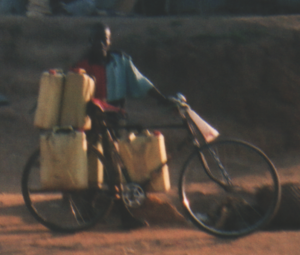
In spite of the importance of water, access to potable water is a great hurdle in some parts of West Africa, specifically Ghana. In some parts of the northern region of Ghana, human beings share the same water with animals. Animals also need water, but in these areas cattle drink and release their droppings in the same lakes and streams humans use.
Sabulugu is a village in the northern region of Ghana where there is little or no access to clean water. Inhabitants have to walk 3.5km to get drinkable water.
This has been the situation in Sabulugu for many years. Thanks to WEBike, though, there has been a change. The need to walk long hours for clean water has now been eliminated. Residents simply tie their water containers to their bicycles and bike to the stream and back in 30 to 40 minutes.
WE EXPRESS OUR PROFOUND GRATITUDE TO WEBIKE!
[Editor’s note: Although we have not been able to get a picture of the water carriers in Ghana, we have seen bicycle water-carriers before. In rural areas, the average Ugandan lives 4 miles from the nearest well. The photograph in this post is of a water carrier from Koytera Uganda. Water carriers put a 10-gallon jerrycan on each side of the back wheel, suspended from a piece of 1” x 3” wood, and then place two more 10-gallon jerrycans on top. That is almost 350 pounds of water! Then they push the bicycle to someone’s house where they dump the water into that person’s cistern for a few shillings and then ride back to the well with the empty plastic containers on the bicycle. They repeat this process dozens of times per day to earn a living and to supply people with the water they need.]
Ghana: Values of the Bicycle
By Ohemaa Sarfoa
Fall 2017 InGear
Because of its numerous uses, a bicycle could be a very cherished vehicle for its possessor. Forty-year-old Mr. Sapaku is a tailor. He has been using a bicycle in his daily dealings for the past ten years. Aside from the thrifty significance of the bicycle, it unknowingly gets rid of some health-related deficits in his body, as biking is a form of exercise.
As part of his schedule, he rides his bicycle to Winneba and back and so is able to keep fit. With his bicycle, he is able to procure all his sewing materials. Further, he distributes his finished garments on his bike. Owing to his work ethic, he never runs out of customers and this is so because of the bicycle. It has contributed a significant increment to his income.
However, recent years have not been so favourable for Mr. Sapaku. His bicycle broke down and efforts to repair it have been futile. Despite his efficiency in his work, his productivity saw a drastic decline. Without his bike, he was not able to deliver finished garments on time. Neither could he save money, now that he had to spend so much on public transportation.
Getting a new bicycle from WEBike caused a remarkable change for Mr. Sapaku. He is now able to save money he used to spend on transportation. In addition, he no longer has to deal with heavy traffic jams.
In summation, the bicycle is a frugal, time-efficient, and health-improving vehicle.
Report from Albania, Fall 2017
Fall 2017 InGear
Albania has one of our most active partners, PASS/Ecovolis, which runs a wide variety of social and environmental programs. An Update from March 2017 mentions two of their programs. One uses P4P/SP sewing machines to make reusable shopping bags and the the other operates a children’s library, LibrAria.
Ened Mato, the PASS director, recently reported on two other PASS projects.
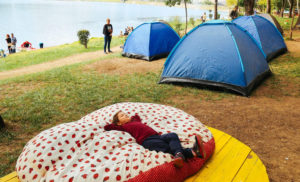
The School of Nature is a children’s program in the Albanian capital, Tirana. The goal of the program is to give urban kids some experience in nature while having fun and learning. Here are some examples of School of Nature activities:
- raise a tent camp
- plant different kinds of flowers
- read books
- paint
- take canoe trips on the artificial lake in Tirana
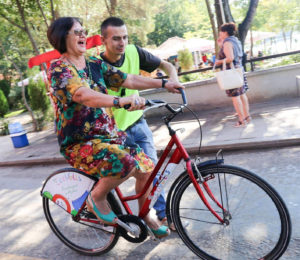 The Elders’ Academy is a program to teach older adults to ride bicycles. Some of the riders have not ridden a bike for many years and some have never learned to ride. I don’t know about you, but the thought of learning to ride a bike at age 50 or 60 sounds a little scary, especially in a busy city like Tirana. But in the photos we’ve seen, these “elders” look like they’re having a blast.
The Elders’ Academy is a program to teach older adults to ride bicycles. Some of the riders have not ridden a bike for many years and some have never learned to ride. I don’t know about you, but the thought of learning to ride a bike at age 50 or 60 sounds a little scary, especially in a busy city like Tirana. But in the photos we’ve seen, these “elders” look like they’re having a blast.
New Jersey DEP 2017 Recycling Award
By Michael Sabrio
Fall 2017
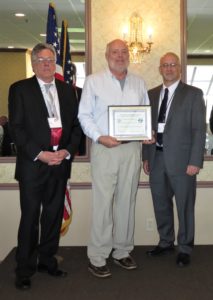
In October 2017, Pedals for Progress won a New Jersey Department of Environmental Protection (NJDEP) Recycling Award.
Dave Schweidenback accepted the award at the Awards Luncheon on 18 October 2017 in Neptune City, New Jersey. In the photo, Guy Watson, President of the Association of New Jersey Recyclers, is on the left in the black suit. Paul Orlando, Director of the Division of Energy Security and Sustainability, NJDEP, is on the right.
The award was for recycling activities in 2015 and 2016, but the application for the award was a chance to give the NJDEP an overall impression of P4P:
- The 4-page Program Narrative has information on our goals, history, business model, overseas partners, and domestic collectors and collection activities.
-
The 14-page Supporting Documentation has lots of specifics:
- what we shipped in 2015 and 2016
- our financial statements from 2016
- some info on collections
- some documents from the red-tape nightmare that Dave deals with for every shipment: bills of lading, letters to foreign customs departments, declarations of contents for the shipping companies, …
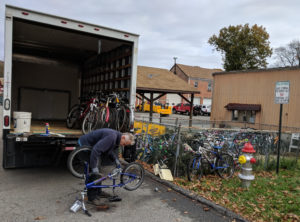
The supporting docs also contain a much appreciated letter of support from Liz Sweedy, our contact at the Morris County Municipal Utilities Authority. Besides running one of our most successful regular collections, Liz arranges for us to pick up bikes from the Denville recycling center, where Gary and I just picked up 59 more bikes on November 8th. In the photo Gary is doing what he’s done many thousands of times: processing a bike. He’s removing the pedals, one of the steps we take to make the bike as small as possible so we can fit as many bikes as possible into a container. The photo also shows our very own sign at the recycling center: “Pedals for Progress Bike Corral. NO removal of bikes or parts.”
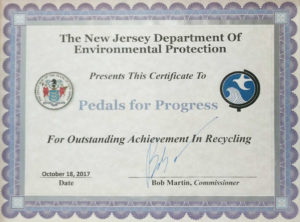
We’re not primarily a recycling organization, but when I did the math, I estimated that since 1991 we’ve shipped more than 4 million pounds of bikes and 74,000 pounds of sewing machines out of the U.S. Not all of this would have been dumped in landfills in the short term, but that’s where it would be sooner or later. And let’s not underestimate the encouragement we provide for cleaning out basements and garages!
Of course recycling is just a happy secondary consequence of our primary mission: to provide economic opportunity to people in developing countries.
Congratulations to P4P for this 2017 NJDEP Recycling Award. Now let’s get back to work.
Progress Report for End of Fiscal Year 2017
On 30 September 2017 we closed the books for fiscal year 2017. (The P4P fiscal year runs from October 1st through September 30th.)
In 2017 we collected 12% more bikes and 55% more sewing machines than in 2016.
Fiscal 2018 starts with a bang: on 23 September 2017 the Vermont Green Mountain Returned Peace Corps Volunteers collected 253 bikes and an astounding 168 sewing machines, all of which is en route to New Jersey. Because it is not yet in our warehouse it cannot be counted as 2017 production, so it will give us a great start to 2018.
|
Bicycles | |
|---|---|
| Fiscal Year 2016 | |
|
|
|
| 2016 Total Bikes Shipped | 2,760 |
| 2016 Bikes Collected | 3,130 |
| 9/30/2016 Bikes in Inventory | 590 |
| Fiscal Year 2017 | |
|
|
|
| 2017 Total Bikes Shipped | 3,644 |
| 2017 Bikes Collected | 3,531 |
| 9/30/2017 Bikes in Inventory | 477 |
|
Sewing Machines | |
| Fiscal Year 2016 | |
|
|
|
| 2016 Total Sewing Machines Shipped | 285 |
| 2016 Sewing Machines Collected | 327 |
| 9/30/2016 Sewing Machines in Inventory | 67 |
| Fiscal Year 2017 | |
|
|
|
| 2017 Total Sewing Machines Shipped | 533 |
| 2017 Sewing Machines Collected | 511 |
| 9/30/2017 Sewing Machines in Inventory | 45 |
Warren Hills Loads a Container for Ghana
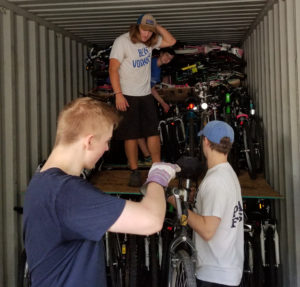
On Saturday, September 23rd, we packed the first container of the 2017 fall season: 536 bikes and 25 sewing machines are on their way to Ghana. The packing crew was from the Computer Science Club of the Warren Hills Regional High School in Washington, New Jersey.
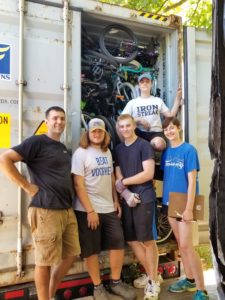
They and their faculty advisor, Daryl Detrick, are no strangers to P4P. Along with the Chess Club, they have run 8 collections and packed 4 containers. Thanks for all you’ve done for P4P over the years.
Blast from the Past
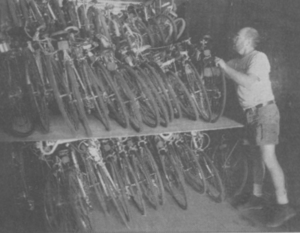
In the fall of 2017, Dave was cleaning his office when a May 1996 article from the Philadelphia Inquirer fell out of a box. Not much has changed at P4P except Dave’s age.
End of the 2017 Collection Season
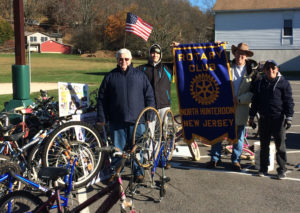
Our 27th calendar year collecting bicycles came to a close today on Veterans Day, November 11th, 2017. On a below-freezing morning, the Bunnvale Assembly of God together with the North Hunterdon Rotary Club collected 106 bicycles and 8 sewing machines — a great result in any weather. We would like to thank all of the participants, and especially Jim Murray, who was instrumental in making this collection happen.
There is a strange dynamic for end-of-season collections in the fall: Once we get to November, people are really thinking about getting their car into the garage, and sometimes unused bikes are in the way, so we have a better chance of collecting a lot of bikes. On the other hand we also have a greater chance of bad weather. Cold weather was obviously not a problem for today’s collection.
I would like to personally thank all of the collectors who have helped make 2017 a record-breaking year, with 12% growth in the collection of bikes and an amazing 55% growth for sewing machines. And to all of you springtime collectors, the time is now to book your spring 2018 collection to get the date you want. Get in touch with Lori at 908-638-4811 or lori@p4p.org.
We have been preoccupied with an incredible fall collection season. However, our new end-of-the-year newsletter is almost ready and we will be getting it to you very soon!

New Jersey Department of Environmental Protection 2017 Recycling Awards Application
In August, 2017, Pedals for Progress applied for a New Jersey Department of Environmental Protection (NJDEP) Recycling Award. Here is the NJDEP Packet announcing the application and specifying the requirements for applying.
As specified in the application packet, we submitted these three parts:
1. Application Form (1 page)
2. Program Narrative (4 pages)
3. Supporting Documentation (14 pages)
The awards will be announced in September. Wish us luck.
